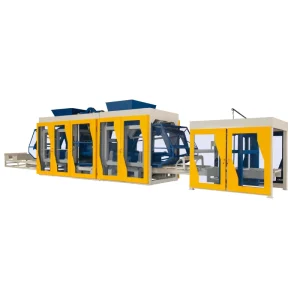2025年にハイテクブロック機械メーカーと提携する5つの理由
8月 28, 2025
要旨
世界の建設セクター、特に急速に拡大する東南アジアや中東の市場では、著しい技術革新が進行している。この進化には、従来の建材生産から、より先進的で効率的、持続可能な方法への戦略的転換が必要である。本稿では、建設企業がハイテク・ブロック機械メーカーと提携することの説得力を検証する。このようなパートナーシップは、単なる調達の決定ではなく、オペレーションの卓越性、製品の優位性、長期的な市場競争力への基礎投資であるとする。この分析では、QTシリーズ全自動コンクリートブロック製造機や静油圧式ブロックプレス機などの高度な設備から得られる具体的なメリットに焦点を当てている。これらの利点には、生産量と生産速度の抜本的な改善、コンクリートブロックの比類なき一貫性と品質の達成、資源利用の最適化による長期的な大幅コスト削減、持続可能な建設に対する高まる要求との整合性、専任の製造パートナーによる貴重なサポートなどが含まれる。この談話は、この先進技術の採用が、2025年以降の厳しい建設情勢の中で成功を目指す企業にとって不可欠であることを示している。
要点
- 完全に自動化されたシステムで生産能力と速度を向上させます。
- 油圧プレスにより、優れた安定したブロック品質を実現します。
- 効率化と無駄の削減により、長期的な運用コストを削減。
- リサイクル素材を使用することで、持続可能な慣行を取り入れる。
- ハイテク・ブロックマシン・メーカーを選択し、強固なサポートを受ける。
- 進化する市場の需要に対応し、ビジネスを将来的に支える。
- 競争の激しい建設プロジェクトで優位に立つ。
目次
- 理由1:生産効率とアウトプットの革新
- 理由2:前例のないブロックの品質と一貫性の実現
- 理由3:長期的な収益性とコスト削減の推進
- 理由4:持続可能性と環境に優しい建設を取り入れる
- 理由5:真のパートナーシップの力:サポート、トレーニング、イノベーション
新しいファンデーション:メーカー選びがこれまで以上に重要になる理由
私たちの都市が築かれている地盤は、基本的な単位であるコンクリートブロックで構成されている。何世紀もの間、これらのブロックの製造は労働集約的で、しばしば不正確な芸術であった。しかし、2025年に向けて、特に東南アジアや中東のダイナミックな経済圏では、建設にまつわる物語が大きく変化している。需要はもはや単なるブロックではなく、精密に設計され、強度が高く、持続可能な方法で生産されたユニットを、一世代前には想像もできなかったような規模とスピードで提供することにある。このシフトは、かつては単純だと考えられていた、ブロック製造機械をどこで調達するかという決断に大きな重みを与えている。
製造パートナーを選ぶことは、企業の将来を決定する行為です。それは、品質へのコミットメント、経済的回復力への戦略、より持続可能な未来への役割の宣言なのです。ハイテクブロック機械メーカーの選定は、単なる機器の取引ではなく、戦略的提携の形成を意味します。このパートナーは、貴社の事業の延長線上にあり、その技術力は貴社の競争優位性に直結します。道具を購入するのではなく、主力製品を完成させるために24時間体制で働く、疲れを知らない非常に熟練したチームメンバーを雇うのだと考えてください。この関係こそが、単に建設ブームに参加する企業と、ブームをリードする企業を分けるものである。リヤドからジャカルタに至る地域の近代開発を特徴づける野心的な建築ビジョンや厳しい技術基準を満たすことができる、永続的な企業が築かれる基盤なのだ。

理由1:生産効率とアウトプットの革新
製造業における効率とは、単なるスピードをはるかに超えた概念である。それは、スピード、一貫性、資源管理、人的努力の複雑な調和である。ブロック生産の文脈では、この調和を達成することは歴史的に難題であった。手作業や半自動化された工程に頼った伝統的な方法は、ボトルネックや一貫性の欠如、規模の限界に悩まされることが多い。しかし、高度な自動化システムの導入は、バラバラの工程からシームレスに統合された生産シンフォニーへのパラダイム・シフトを意味する。
現代のオートメーションのメカニズムQTシリーズを理解する
この変化の大きさを把握するためには、マシン自体の内部を見なければならない。例えば QTシリーズ全自動コンクリートブロック製造機.これらは単にコンクリートをプレスする機械ではなく、中央のプログラマブル・ロジック・コントローラー(PLC)によって制御される高度な統合システムである。このPLCは、オーケストラの指揮者のような役割を果たす。このPLCはオーケストラの指揮者のような役割を果たし、プロセスのあらゆるステップをデジタル精度で正確に調整する。
PLCは、セメント、砂、骨材、水の正確な重量がすべてのバッチで混合されることを保証します。当てずっぽうの作業はなく、"ほぼ十分 "ということもありません。そこから、完璧に混合されたコンクリートがメインマシンのホッパーに運ばれます。その後、PLCが正確な量の材料を金型に指示し、高周波振動と強力な油圧が綿密にタイミングを合わせて続きます。この二重の作用によって材料が圧縮され、エアポケットが排出され、緻密で均質なブロックが出来上がる。同時に、新しいパレットが所定の位置に供給され、新しく成形されたブロックが押し出され、完成したパレットが自動スタッカーによって運び出される。
この一連の流れは、連続的で流動的な動きであり、各工程で人間の介入を必要とし、変動や遅れが生じる手動や半自動運転のスタート・ストップとは対照的である。自動化されたシステムは容赦がなく、1000個目のブロックでも最初のブロックと同じ精度でタスクを実行する。
利益の定量化スピード、量、労働力の最適化
この自動化の最も直接的で顕著な利点は、生産量の劇的な増加である。半自動マシンが1日に数千個のブロックを生産するのに対し、全自動ラインでは数万個のブロックを生産することができる。これは、単に速く動くということではなく、よりスマートに、より長く稼働するということなのだ。これらの機械は、ほぼ連続運転ができるように設計されているため、大規模建設プロジェクトの旺盛な需要に対応できる複数シフトが可能だ。
労働力の最適化も大きな利点だ。従来のブロック・ヤードでは、混合、成形、運搬、積み重ねに大規模なチームが必要な場合があった。対照的に、完全自動化ラインは、熟練した技術者の少人数チームで監督することができる。彼らの役割は、手作業からシステムの監視と品質管理へと移行する。このような労働力への依存度の低下は、操業コストを下げるだけでなく、労働力不足、安全性、ヒューマンエラーに関する問題を軽減する。財務的なインパクトは直接的かつ大きく、資本と人的資源を解放し、事業の他の分野に投資することができる。
現場からのケーススタディ:中規模オペレーションを変革する
フィリピンのセブのような成長都市にある家族経営の建設資材業者を想像してみてほしい。同社は長年、2台の半自動機械で操業している。生産量には上限があり、生産制限のために政府の大規模インフラプロジェクトの入札に苦戦し、人件費は着実に上昇している。彼らは、評判の高いハイテクブロック機械メーカーの全自動QTシリーズラインに投資する戦略的決断を下す。
半年も経たないうちに、彼らの現実は一変した。1日の生産能力が4倍になったのだ。高層ビル用の中空ブロック、新しい商業地区用の舗装材、基礎用のソリッドブロックなど、さまざまなブロックを、型を変えるだけで同じラインから生産できるようになったのだ。技術者として再教育された従業員たちは、より積極的に働き、その価値を高めている。新空港ターミナルの資材供給という、以前は夢物語でしかなかった大型プロジェクトの入札に成功し、受注を勝ち取った。彼らの初期投資は、もはやコストとしてではなく、事業を新たなレベルの運営と収益性へと押し上げる起爆剤と見なされるようになった。これが、ハイテク・オートメーションの具体的な力である。
理由2:前例のないブロックの品質と一貫性の実現
建築において、品質とは抽象的な理想ではなく、安全性、耐久性、価値を測定可能な形で具現化したものである。建物は、その最も弱い部分と同じ強さしか持たない。多くの構造物にとって、その弱い部分とは、質素なコンクリート・ブロックである。ブロックの大きさ、強度、密度にばらつきがあると、構造上の弱点が生じたり、工期が延びたり、完成品が美観や工学的な期待にそぐわなくなったりする。したがって、品質の追求は、精度の追求であり、高度な製造技術によってのみ達成可能な目標なのである。
精度の科学:静水圧プレスはいかにして基準を高めるか
優れたブロック品質の核心は、静油圧式ブロックプレス機の技術にある。その影響を理解するには、物理学的な仕組みを理解する必要があります。コンクリートブロックを成形する目的は、可能な限り緻密で均一に圧縮された材料を作り、弱点となる空洞やエアポケットをなくすことです。
従来の方法では、振動だけに頼ったり、機械的なプレスに頼ることが多く、ブロックの表面全体に一貫性のない力がかかることがありました。しかし、静的油圧システムは異なる原理で作動する。パスカル(Pascal')の原理により、あらゆる方向に均等にかかる流体圧を利用します。油圧プレスがコンクリートを充填した金型に降りかかると、表面積全体に巨大で均一な力がかかる。これはしばしば同期した高周波振動と組み合わされる。振動は混合物を瞬間的に液化させ、粒子が最もコンパクトな配置に落ち着くことを可能にし、一方、油圧からの巨大で安定した圧力は、残っている空気や余分な水分を絞り出します。
その結果、優れた圧縮強度、卓越した密度、端から端まで、またブロックからブロックまで驚くほど均一なブロックが出来上がります。この科学的な精度は、手動のタンピングやそれほど高度でない機械システムでは再現できないものです。これは、単に形状を保持するだけのブロックと、設計された構造部品としてのブロックの違いです。
表1:手作業とハイテク・ブロックの比較
| 特徴 / メートル | 伝統的/マニュアル生産 | ハイテク自動生産 | 建設業者への影響 |
|---|---|---|---|
| 圧縮強度 | 変動が大きい。 | 常に高い水準にある。 | 構造的完全性と安全性の向上。 |
| 寸法精度 | 低~中;±数mm | 極めて高いサブミリメートル精度 | モルタルの量が少なくて済むため、石積み作業がより速く、簡単になる。 |
| 密度と気孔率 | 一貫性がなく、ボイドや高気孔率が発生しやすい。 | 均一な密度で、空隙率および吸水率が低い。 | 耐久性、耐候性、断熱性が向上。 |
| 廃棄率 | 高い。 | 最小限の、一貫して高品質な出力 | 材料費の大幅な節約と、現場清掃の軽減。 |
| 労働依存 | 高い。 | 品質が低く、マシンにプログラムされている | オペレーターに関係なく、予測可能で再現性のある結果が得られる。 |
| 表面仕上げ | 粗く不規則なことが多い | 滑らかでクリーンなラインとシャープなエッジ | 露出したブロックワークの美観に優れた仕上げ。 |
地域基準を満たし、上回る
中東や東南アジアの建設市場では、国際建築基準への準拠はオプションではありません。ASTMインターナショナル(旧米国材料試験協会)や英国規格(BS)などの規格が、品質と安全性の法的基準となっている場合が多い。ブロック製造業者にとって、これらの基準を満たせないことは、最も有利で一流のプロジェクトから除外されることを意味します。
ハイテク・ブロック・マシン・メーカーは、これらの基準を満たし、場合によってはそれを上回るよう、特別に装置を設計します。ミキシング、振動、油圧を正確に制御することで、製造されるブロックはすべて、圧縮強度、吸水性、寸法公差に関する厳しい試験に常に合格することができます。これにより、建設会社は単に優れたブロックを手に入れるだけでなく、確実性と強力なセールスポイントを手に入れることができる。ドバイの超高層ビルからフィリピンの耐震住宅まで、最も要求の厳しい仕様のプロジェクトに自信を持って資材を供給し、妥協のない品質で高い評価を得ることができる。
美的アドバンテージ近代建築の完璧な仕上げ
構造上の完全性だけでなく、美観の問題もある。現代建築、特に湾岸の裕福な市場では、建材の生の美しさを称えることが多い。むき出しのブロック積み、建築用フィン、装飾的なスクリーン・ウォールなどが一般的な特徴だ。これらのデザインを成功させるには、ブロック自体が完璧でなければならない。
静的油圧プレスの精度は、シャープできれいなエッジ、滑らかな面、一貫した色と質感を持つブロックを生み出す。この均一性は視覚的にも印象的です。石工は、モルタルの目地がきつく、きれいな壁を作ることができます。この美的完成度の高さにより、建築家は自信をもって設計することができ、請負業者はより高い価値のある高級仕上げを提供することができる。視覚的アピールが最重要視される市場において、審美的に完璧なブロックを製造する能力は、競争上の重要な差別化要因となる。
理由3:長期的な収益性とコスト削減の推進
ハイテク・ブロック製造マシンの初期導入には、多額の資金が必要となる。そのため、より安価で、より先進的でない選択肢を選ぶことをためらう経営者もいる。しかし、このような視点は、購入価格のみに注目し、生涯運用コストや収益の可能性といった、より大きな視点を無視したものです。大手ハイテク・ブロックマシン・メーカーの高性能マシンは、経費としてではなく、収益性のための長期投資と考えるべきです。経済的な見返りは、購入したその日ではなく、効率的で高品質な生産を何年も続けることで実現するのだ。
初期投資を超えて:総所有コスト(TCO)の計算
より賢明な財務分析では、総所有コスト(TCO)の概念を用いる。TCOは、初期購入、設置、エネルギー消費、労働力、メンテナンス、スペアパーツ、材料廃棄物など、機械のライフサイクル全体にわたって、機械に関連するあらゆるコストを考慮する。このレンズを通して見たとき、先進的な機械の経済的ケースは圧倒的に強くなる。
初期費用は高くつくが、他の分野での節約は急速に蓄積される。説明したように、人件費の削減が大きな要因である。効率的な油圧およびモーター設計によるブロックあたりのエネルギー消費の低減は、日々の節約に貢献する。しかし、最も大きな要因は、材料廃棄の大幅な削減であることが多い。これらのシステムの精度は、不合格ブロックの数を減らし、流出や不適切な混合による原料の損失を減らすことを意味する。このような運転上の節約は、数年にわたり、最初の価格差を回収できるだけでなく、安価で効率の悪い機械と比較して、実質的に高い純利益を生み出すこともある。
表2:TCOの比較:従来型ブロックマシンとハイテクブロックマシンの比較(5年予測)
| コスト・カテゴリー | 半自動機(説明用) | QTシリーズ全自動機(図解) | 違いの分析 |
|---|---|---|---|
| 初期購入費用 | $50,000 | $150,000 | ハイテクマシンは初期投資が大きい。 |
| 年間人件費 | $120,000(例:6人の労働者) | $40,000(例:技術者2名) | 直接人件費で年間$8万円の節約。 |
| 年間廃棄物 | $30,000(例:5%の廃棄率) | $6,000(例:廃棄率1%未満) | 年間$24,000の原材料費節約。 |
| 年間メンテナンス | $10,000(頻度が高く、予測は困難) | $5,000(予定、より信頼できる) | メンテナンスコストの削減とダウンタイムの短縮 |
| 5年間の総労働力 | $600,000 | $200,000 | 5年間で1TP440,000の節約となる。 |
| 5年間の総廃棄物 | $150,000 | $30,000 | 5年間で$12万ドルの節約になる。 |
| 5年間の総コスト | $810,000 | $395,000 | このハイテクマシンは、50%以上安く所有・運用できる。 |
注:数値は例示であり、現地のコスト、生産量、機械の仕様によって異なる。
マテリアルマスタリー廃棄物の削減と原材料比率の最適化
セメントは通常、コンクリートミックスの中で最も高価な成分である。そのため、強度を損なわずにセメントの使用量を削減できれば、収益に直結します。ハイテク・ブロック・マシン・メーカーは、それを実現するために、ミキシング・システムとプレス・システムの研究開発に多額の投資を行っています。
強力で的を絞った振動と強力な水 圧圧縮の組み合わせにより、ブロックは高密度にな り、多くの場合、必要な圧縮強度(MPaまたは PSIで測定)を、よりリーンミックス、つまりセメントと骨材の比率を低くして達成することができます。PLC制御のバッチシステムは、この最適化された比率がすべてのミックスに使用されることを保証するため、手作業によるミックスにありがちな、余分なセメントというコストのかかる「安全マージン」を排除することができます。年間数百万個のブロックを生産する施設では、ブロック1個当たりのセメントを少量でも節約すれば、年間では莫大な節約になる。このように材料を使いこなすことは、高度な生産技術の特徴である。
新たな市場機会の開拓
収益性とは、単にコストを削減することではなく、収益を増やすことでもある。汎用性の高いハイテク機械は、新たな、より有利な市場を切り開く鍵である。金型を迅速かつ容易に変更できるということは、1つの生産ラインで多様な顧客ニーズに対応できるということだ。
ある日、この機械は商業タワー用の高強度構造ブロックを製造しているかもしれない。次の日には、高級住宅地向けにカラフルで複雑な形状のインターロッキング舗装を製造しているかもしれない。その翌日には、エネルギー効率の高い建築プロジェクト用の断熱ブロックを製造しているかもしれない。これらの製品はそれぞれ、標準的な灰色のブロックとは異なる、多くの場合より高い価格帯で販売される。こうしたニッチ市場に対応することで、企業は収益源を多様化し、汎用ブロック市場の価格競争から身を守ることができる。このような敏捷性は、評判の高いブロック・メーカーのようなパートナーによって提供される。 コンクリートブロック製造機サプライヤーこれにより、ブロックメーカーは単なる製造業者から、建設業界全体に対する多目的なソリューション・プロバイダーへと変貌を遂げる。
理由4:持続可能性と環境に優しい建設を取り入れる
気候変動と環境責任をめぐる世界的な話題は、企業や政府の政策の最前線へと移りつつある。東南アジアや中東は、急速な都市化と気候の脆弱性からくる独特の環境圧力に直面している地域であり、「グリーン・ビルディング」の推進は強力な勢いを増している。政府はより厳しい環境規制を実施し、持続可能な建設に対するインセンティブを提供している。同時に、大企業から個人住宅所有者に至るまで、顧客は経済的に実行可能であるだけでなく、生態学的にも健全な建物を求めるようになっている。ブロックメーカーにとって、この変化は挑戦であると同時に大きなチャンスでもある。ハイテクブロック機械メーカーと提携することは、この需要に正面から応える最も直接的な方法のひとつです。
現代建設におけるグリーン・インパータティブ
持続可能な建設とは、原材料の調達から最終的な解体まで、建物のライフサイクル全体を通して環境への影響を考慮する総合的なアプローチである。ほとんどの建物の基礎要素であるコンクリートブロックの製造は、このライフサイクルの重要な部分である。従来のセメント生産は、エネルギーを大量に消費し、CO2を大量に排出することで知られている。したがって、必要なセメントの量を減らし、リサイクル材料を取り入れ、製造時に消費されるエネルギーを削減するような技術革新は、環境に優しい建築慣行への重要な一歩となる。
自社製品のカーボンフットプリントが低いことを証明できる企業は、強力な競争優位性を獲得する。政府出資のインフラ・プロジェクトや、(LEEDやBREEAM基準に従ったような)グリーン認証を受けた商業ビル、環境に配慮した民間開発などで、優先的に供給されるサプライヤーとなるのだ。これは単なる企業責任ではなく、21世紀の市場における賢明なビジネス戦略なのである。
リサイクル材とフライアッシュの使用
持続可能なブロック製造における最もエキサイティングな進歩の一つは、補助セメント質材料(SCM)と再生骨材を使用する能力である。その代表例が、石炭火力発電所の副産物であるフライアッシュである。歴史的に埋立地での処分を必要とする廃棄物と考えられてきたフライアッシュは、ポルトランドセメントの優れた部分的代替品となる特性を持っています。
ハイテク・ブロック・マシンは、このような代替材料を効果的に扱うように設計されています。ミキシングの精度と油圧プレスのパワーにより、フライアッシュ、高炉水砕スラグ(GGBS)、あるいは粉砕再生コンクリートをかなりの割合で含むミックスを使用して、強靭で耐久性のあるブロックを作ることができます。これは2つの重要な環境目標を同時に達成する。すなわち、産業廃棄物を埋立地から転換し、新しいセメントの需要を減らすことで、ブロック全体の二酸化炭素排出量を削減することである。先見の明のあるハイテク・ブロック・マシン・メーカーは、地元で入手可能なリサイクル材料の活用に特化したガイダンスとマシンキャリブレーションを提供し、地域の廃棄物問題を貴重な資源に変えます。専門家が指摘するように、全工程で品質を確保するためには、エンジニアリング分野の相乗効果が必要である(unikblockmachines.com).
製造工程におけるエネルギー効率
製造工程自体も、環境面で大きな改善が可能な分野である。最新の機械は、エネルギー効率を基本原理として設計されている。これには、可変周波数ドライブ(VFD)を備えた高効率の電気モーターの使用が含まれ、連続的にフルパワーで運転するのではなく、タスクの正確なニーズに合わせて消費電力を調整する。
高度な油圧システムは、エネルギー損失を最小限に抑えるようにも設計されています。インテリジェントな回路とアキュムレータを使用し、圧力を効率的に貯蔵・放出することで、油圧ポンプとモータの負担を軽減します。このような小さな効率に、機械が毎日行う何千ものサイクルを掛け合わせると、累積エネルギー節約は相当なものになる。これは、ブロックヤードの二酸化炭素排出量を削減するだけでなく、電気料金の削減にもつながり、持続可能な実践と財務的収益性との結びつきを強化する。
理由5:真のパートナーシップの力:サポート、トレーニング、イノベーション
洗練された産業機械の購入は、重要なビジネス関係の始まりであり、終わりではありません。どんなに高度な機械であっても、それを操作し、メンテナンスする人がいてこそ、その機械は有効に機能する。その潜在能力は、強力な技術サポート、包括的なトレーニング、継続的な技術革新のエコシステムの中でこそ、十分に発揮される。ここが、単なる売り手と真のパートナーとの違いが最も明確になるところである。売り手は箱を提供しますが、パートナーは完全なソリューションと顧客の成功へのコミットメントを提供します。ハイテク・ブロックマシン・メーカーを選ぶことは、このパートナーシップを長期にわたって確保することなのです。
機械以上のもの:アフターセールス・サポートの価値
オマーンの僻地やインドネシアの発展途上の島にある施設に、最新鋭の生産ラインが設置されたとします。重要なセンサーが故障したり、オペレーターが新しい骨材に対応する機械の較正方法がわからなくなったりします。このようなとき、メーカーのアフターサポートの質がすべてです。
一流のハイテク・ブロックマシン・メーカーは、このことを理解しています。お客様へのコミットメントは、販売だけにとどまりません。このサポート体制には通常、以下のものが含まれます:
- 専門家による設置と試運転 技術者がお客様の現場に出向き、マシンが正しく設置され、既存のインフラと統合され、初日から最適なパフォーマンスを発揮できるよう試運転を行います。
- 包括的なオペレーター・トレーニング マニュアルを渡すだけではありません。操作、定期メンテナンス、トラブルシューティング、安全プロトコルを網羅した、スタッフ向けの実践的なトレーニングを提供します。これは、あなたのチームが自信を持って効率的に機械を運転する権限を与えます。
- 入手しやすいスペアパーツ: また、重要なスペアパーツの在庫をしっかりと管理し、ロジスティクス・ネットワークを駆使して、お客様の所在地を問わず、迅速にスペアパーツをお届けします。これにより、製造業において最大のコストとなりがちなダウンタイムを最小限に抑えることができます。
- 迅速な技術サポート: リモート診断や、電話またはビデオ通話で問題のトラブルシューティングをサポートするエンジニアによる専用サポートラインを提供し、稼働を再開するための即時サポートを提供します。#39;会社の歴史と哲学を研究することは、多くの場合、'会社概要'ページに記載されており、これらの長期的な関係へのコミットメントを洞察することができます。のような企業の背景を探る。 KBL機械 は、顧客の成功への献身を明らかにすることができる。
カスタマイズと将来を見据えたオペレーション
東南アジアと中東の建設市場は一枚岩ではない。入手可能な原材料、気候条件、具体的な建築要件は、国によって大きく異なります。万能の機械が最適なソリューションであることは稀です。
真の製造パートナーは、コンサルタントとしてあなたとともに働きます。お客様の具体的なニーズや課題に耳を傾けます。地元の砂や骨材のサンプルを分析し、理想的な金型設計や圧縮設定を提案することもあります。機械のレイアウトをカスタマイズして、お客様の工場の特定のフットプリントに合わせることもできます。このような協力的なアプローチにより、お客様の手元に届く機械は単なる標準モデルではなく、お客様独自の操業状況に最適化されたオーダーメイドのソリューションとなるのです。この協力的な精神は、お客様の#39;プロジェクトを成功させることを目的とするソリューション・プロバイダーの中核となる考え方です(ホンチャンマシン).
さらに、将来的な投資にも対応します。より高度な制御システム、ロボット・ハンドリング・ユニット、革新的なブロック・デザインのための新しい金型など、将来のアップグレードを可能にします。これにより、お客様の生産ラインは、お客様のビジネスや市場とともに進化し、初期投資を将来にわたって保護することができます。
イノベーションへの直通電話
建設技術の世界は常に進歩している。新素材、より効率的なプロセス、よりスマートなオートメーションは常に視野に入っています。大手ハイテクブロック機械メーカーとパートナーになれば、この技術革新の最前列に座ることができます。あなたはもはやテクノロジーの単なる消費者ではなく、その源とつながっているのです。
これらのメーカーは研究開発に深く投資している。強度を向上させ、サイクルタイムを短縮し、エネルギー効率を高めるために、常に新しい技術を試しています。パートナーとして、この継続的な改善から利益を得ることができます。彼らは、新しいアップグレードをお知らせし、新たな業界動向に関する洞察を共有し、将来の課題や機会に適応する方法についてガイダンスを提供します。この関係は、あなたのビジネスは、競争の先を行くための知識と技術を装備し、積極的なリーダーに反応フォロワーから変換します。それは、成長と回復力、そしてより良い未来を築くためのコミットメントを共有するパートナーシップです。
よくある質問(FAQ)
全自動ブロックマシンと半自動ブロックマシンの主な違いは何ですか?
全自動ブロック・マシンは、材料のバッチ処理、ミキシングから成形、搬送、積み重ねまで、生産の全工程を中央のPLCシステムによって制御される単一の連続工程に統合します。人の介入は最小限に抑えられ、主に監督のために必要です。半自動機では、完成したブロックの移動やパレットの供給など、いくつかの重要な段階で手作業が必要となるため、生産量が低下し、安定性が低下し、人件費が高くなる。
QTシリーズの生産ラインにはどのくらいのスペースが必要ですか?
必要なスペースは、養生室や保管ヤードなど、特定のモデルや希望する自動化レベルによって異なる。しかし、典型的な中型のQTシリーズ全自動ラインでは、バッチプラント、主機、スタッカーを含めて、約500~1,500平方メートルの作業場面積が必要になる場合がある。専門メーカーであれば、お客様の現場に合わせた詳細なレイアウトプランをご提案いたします。
これらの機械は、異なるタイプのブロックを製造できるのか?
そう、ハイテク・ブロック・マシンの重要な利点のひとつは、その汎用性にある。通常、短時間で済む金型を交換するだけで、同じ機械で多種多様な製品を生産できます。これには、中空ブロック、ソリッドブロック、インターロッキングペイバー、縁石、特殊断熱ブロックなどが含まれ、1回の投資で複数の市場セグメントに対応できます。
どのような原材料を使用できるのか?
これらの機械は頑丈で、様々な原料に適応できるように設計されている。標準的な配合には、セメント、砂、砕石または砂利、水が含まれる。また、ハイテク機械は、フライアッシュ、スラグ、粉砕再生コンクリートなどの副原料を効果的に組み込めるように設計されており、持続可能で費用対効果の高い生産を支えている。
ハイテク・ブロック・マシンに投資した場合の一般的なROIは?
正確な投資収益率(ROI)は、地域の市場価格、人件費、生産量によって異なりますが、一般的に非常に有利です。労働力の大幅な節約、材料の無駄の削減、生産量の増加により、多くの企業が18ヶ月から36ヶ月以内に初期投資の完全な回収を達成し、その後も大幅な収益性を実現しています。
スタティック油圧プレスはどのようにブロックの品質を向上させるのか?
静的油圧プレスは、金型内のブロックの表面全体に巨大で最も重要な均一圧力をかけます。これと同期した振動を組み合わせることで、コンクリートミックスを非常に高い密度に圧縮し、弱点やエアポケットをなくします。その結果、圧縮強度に優れ、吸水率が低く、正確で一貫した寸法のブロックが出来上がります。
これらの機械にはどのようなメンテナンスが必要ですか?
他の産業機器と同様、長寿命と最適な性能を確保するためには、定期的なメンテナンスが必要です。これには、毎日の清掃、作動油レベルや可動部品の定期的なチェック、金型ライナーのような消耗部品の定期的な交換などが含まれます。信頼できるメーカーは、詳細なメンテナンス・スケジュールとトレーニングを提供し、現場チームがこれらの作業を簡単に行えるようにしています。耐久性とメンテナンスのしやすさを重視することは、購入の際の重要な検討事項である(リートマシン・ドットコム).
将来の成功の礎石
2025年、野心的な建設企業が進むべき道は、従来のレンガやモルタルではなく、最新技術のインテリジェンスによって切り開かれる。ハイテク・ブロックマシン・メーカーとの提携を決定することは、単なる設備購入の枠を超え、どのような企業になるかという基本的な戦略的選択となる。それは、卓越性へのコミットメントであり、長期的な財務健全性への投資であり、建築環境の責任ある管理者としての役割の宣言なのです。
自動化の効率性、油圧プレスの精度、そして持続可能な素材への期待を取り入れることで、より良いブロックを作るだけではありません。より弾力性があり、機敏で収益性の高いビジネスを構築しているのです。現代建築の厳しい基準や、より環境に優しい建設への切実な要請に応えるための設備を整えようとしているのです。東南アジアや中東の競争の激しい土地では、進歩がスカイラインやインフラで測られるため、基礎の質が志の高さを左右します。適切な技術パートナーは、品質と革新の永続的な遺産を築く礎石となる、そのような基盤なのです。
参考文献
本茶。(n.d.).ブロックマシン, ブロック製造機, レンガマシン.Hongchang Machine.2025年8月27日、以下より入手。 https://www.hongchangmachine.com/
KBT Machineries.(n.d.).KBT Machineries.LinkedIn.2025年8月27日、以下から取得。 https://www.linkedin.com/company/kbt-machineries
KM ムガール機械メーカー.(n.d.).KMムガール機械メーカー.LinkedIn.2025年8月27日、から取得。 https://www.linkedin.com/company/km-mughal-concrete-blocks-making-plant
リート・マシン(2025年2月8日)。ブロック製造機について知っておくべきことすべて。2025年8月27日、以下より入手。 https://www.reitmachine.com/2025/02/08/everything-you-need-to-know-about-block-making-machines/
ユニク。(2024年12月21日)。中空ブロック製造機使用ガイド.Unik Block Machines.2025 年 8 月 27 日、以下から取得。 https://www.unikblockmachines.com/info/hollow-block-making-machine-usage-guide-102762800.html


